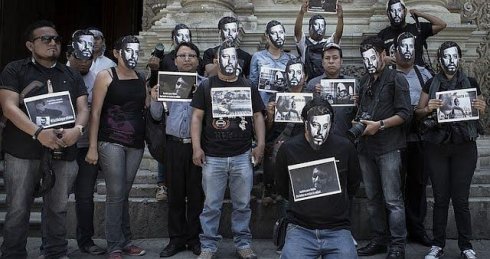Photo: La Izquierda Diario Mexico
Ruben was a self-taught photojournalist that was working for the political magazine Proceso at the time of his death. In 2009, he worked for Javier Duarte (PRI) when he ran for mayor in Veracruz. Ruben became a problem for the Duarte administration and later had to resign from his job in the public sector because of his critical reporting and active involvement in the movement against the violence suffered by journalists all over Mexico.
In the state of Veracruz, from 2011 to 2015, 12 journalists were killed. All of the cases involve the government’s armed forces as the primary suspects. Ruben Espinosa knew, just like everybody else, that the administration was undeniably responsible for his colleagues’ murders.
All of the murdered journalists published information incriminating Duarte and his staff. As we saw in the Ayotzinapa case, Mexican government officials are no strangers to intimidation, threats, and outright murder to silence people they deem dangerous to their own interests.
These are just a few examples of the threats Ruben received from authorities:
In 2012, Ruben was covering the protests against the murder of journalist Regina Martinez. Another Proceso magazine correspondent.When an alleged government employee approached to him and said, “Stop taking pictures if you don’t want to end up like Regina.”
After that, in 2013 he got violently arrested with several reporters while they were taking pictures of the police brutally attacking students and teachers in Xalapa. Once in custody, authorities forced him to delete all of his pictures. In response, he filed a complaint against the police. The result of this complaint was constant harassment.
In yet another example last June, during the midterm elections, Ruben documented 8 students being beaten by public security personnel. Since then, he started noticing that armed men were following him around and taking pictures of him. Fearing for his life, Ruben moved to Mexico City, which is considered to be safer for persecuted journalists.
Yet, Mexico is not a safe place for journalists critical of the government. Ruben was brutally murdered.
These dreadful crimes exhibit the core problems faced by Mexican society today. The first one is the corruption of the politicians who behave more like mobsters than actual politicians. One of the most famous examples of this is the Ayotzinapa case, where the mayor of a state is the primary person responsible for violence against students, teachers and the civilian population in general.
If we look back further in history, we’ll see that this attitude towards the people is commonplace within the Mexican government.
Furthermore, there’s the problem of violence against women, an endemic in Mexico. It is estimated that every 3 hours a woman is murdered in Mexico. Four women were killed alongside Ruben and three of them were tortured and raped by their aggressors (a horrible and tragically common form of humiliation against women). Little is known about the other two victims; one of them was from Colombia and the other was a housekeeper. They are still—shockingly—unidentified. The authorities don’t even bother to investigate who they are- they are just another two women killed. This official attitude of scorn for the victims just confirms the crisis of violence against women.
Source: La Izquierda Diario Mexico










